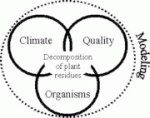Organizers: Grizelle González*, Whendee Silver and D. Jean Lodge (LUQ); *Corresponding organizer (ggonzalez@fs.fed.us).
The objectives of the workshop were to present the “state” of decomposition research in the LTER Network, identify the gaps in knowledge of data and study factors in sites within the Network, and determine “bridge” questions in an effort to start the process of synthesis given available data. The workshop consisted of invited talks and discussion on synthesis and research initiatives. Talks covered three main factors affecting litter decay: climate (I. Burke, SGS), substrate quality (M. Harmon, AND), and organisms (D. Coleman, CWT) and considered modeling (W.J. Parton, SGS; J. Moore, ARC/SGS ) as an integral component of the synthesis effort (Fig. 1). Participants represented 14 U.S. and 4 International LTER Sites.
Recommendations towards synthesis include updating and accounting of published studies on the LTER Bibliography. At the Network level, there is a wealth of data related to N dynamics and organismal aspects of litter decay. Models incorporating long-term chemical data as well as organismal information are needed to accurately predict ecosystem functioning, particularly C and N dynamics.
Participants agreed that this is an important theme on which to built cross-site and interdisciplinary synthesis and the integration process will greatly advance the science of decomposition studies in the Network. Ideas for accomplishing this are a symposium and a book. A detailed report of the workshop will be available at LUQ, through presenters and the LTER Network Office.

 Enlarge this image
Enlarge this image